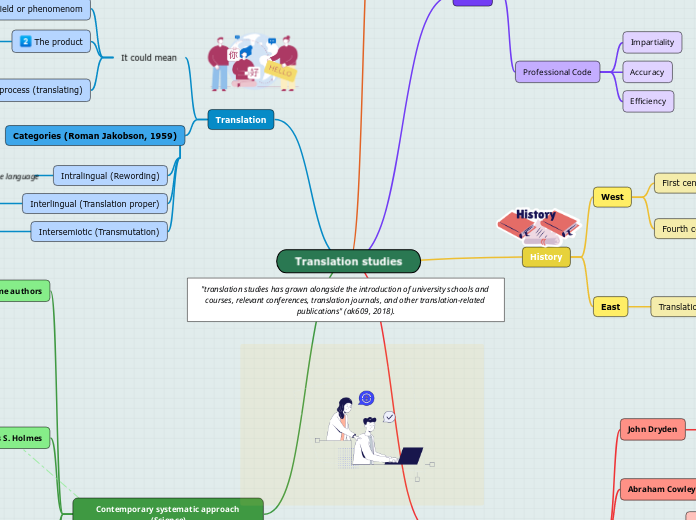Translation studies
Ethics
Aspects for why translation requieres a mediation
Accountability
Translators can be held accountable for how and what they translate
Professional engagement
Translators and interpreters have expressed their opinions on different issues and their ethics.
Political conflict
Ethical judgement is needed for translators in conflict zones
Technological advances
Some practices are considered as a threat by the community
Professional Code
Impartiality
Accuracy
Efficiency
History
West
First century AC
Cicero - De optimo genere oratorum
Horace - Ars Poetica
Fourth century AC
St. Jerome - Christian Bible
East
Translation of the Buddhist Sutras
Han Dynasty and the Three Kingdoms Period (c.148–265)
word-for-word translation
Jin Dynasty and the Northern and Southern Dynasties (c.265–589)
Kumārajīva - yiyi (free translation)
Sui Dynasty, Tang Dynasty and Northern Song Dynasty (c.589–1100)
Xuan Zang - style of the ST
Early systematic translation theories
John Dryden
Categories of translation
Metaphrase
Literal translation/word-for-word
Paraphrase
Free translation/sense-for-sense
Imitation
Adaptation
Abraham Cowley
Imitation; free translation
Yan Fù
xìn (fidelity/faithfulness/trueness),
dá (fluency/expressiveness/intelligibility/comprehensibility)
yă (elegance/gracefulness).
Alexander Fraser Tyler
Translation "oriented towards the target language reader" (Munday, 2016, p.45).
Friedrich Schleiermacher
"Move the reader towards the writer" (Munday, 2016, p.48).
Interdiscipline
"links between different types of knowledge and technologies" (Munday, 2016, p.25)
Linguistics
Comparative literature
Cultural studies
Philosophy
Gender studies
Computer science
Specialized translation courses
Munday (2016) suggests that courses should include a component "of instruction in the disciplines in which the trainees are planning to translate" (p.26)
Translation
It could mean
The field or phenomenom
The product
The text
The process (translating)
Source text (ST)/Source language (SL)
Target text (TT)/Target Language (TL)
Categories (Roman Jakobson, 1959)
Intralingual (Rewording)
Interpret verbal signs of the same language
Interlingual (Translation proper)
Interpret verbal signs of one language to another
Intersemiotic (Transmutation)
Interpret verbal signs to non-verbal sign systems
Contemporary systematic approach (Science)
Some authors
Andrei Fedorov’s Osnovy, Jean-Paul Vinay and Jean Darbelnet, Alfred Malblanc, Georges Mounin, Eugene Nida.
James S. Holmes
Pure translation studies
Theoretical
Establishment of principles
General
Partial
Descriptive
Description of the phenomena
Product-oriented (existing translations)
Function-oriented (contexts rather than texts)
Process-oriented (psychology of translation)
Applied translation studies
Translator training (teaching methods, techniques, curriculum design)
Translation aids (dictionaries)
Translation criticism (evaluation of translations)
Werner Koller
Equivalence
"Relationship between a ST unit and a TT unit "(Routledge, n.d.)
Correspondance
"Resemblance and difference between words and structures in their linguistic forms" (Routledge, n.d.)
Gideon Toury
Adequate and acceptable translation
Adequate
The TT is adequate when the translation oscillates towards the ST
Acceptable
The TT is acceptable when the target culture norms prevail
Translation equivalence
van Doorslaer's map
Translation
lingual mode
e.g. interlingual, intralingual
media
e.g. printed, audiovisual, electronic
mode
e.g. mother tongue/other tongue
field
e.g. political, journalistic, technical, literary, religious, scientific, commercial).
Translation studies
approaches
e.g. cultural approach, linguistic approach
theories
e.g. general translation theory, polysystem theory
research methods
e.g. descriptive, empirical
applied translation studies
e.g. criticism, didactics, institutional environment

ak609 (2018, April 17). What is Translation Studies? Translation Studies at Exeter. https://blogs.exeter.ac.uk/translation/blog/2018/04/17/what-is-translation-studies/


